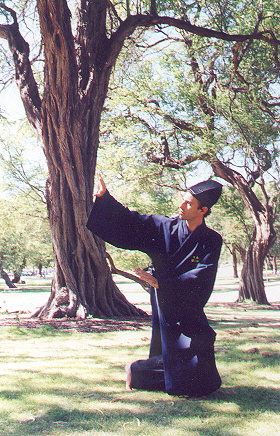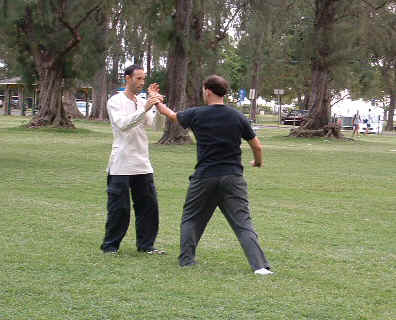HOME Calendar Consultation Clinic Divination Texts Video Music Theatre Acupuncture Herbs Tuina Nutrition Qigong
QIGONG (MEDITATION EXERCISE)

Lotusspace encourages an exercise method that is compatible to our client's constitution, and that can be done regularly and consistently. Lotusspace specializes in Qi Gong.
In Chinese, "qi gong," pronounced "chee gung," translates literally as "energy work," or "attaining merit from working with qi."
Visualization, Deep Breathing, Flowing Postures
Qi Gong is an ancient Chinese exercise art that promotes recovery, rejuvenation, and longevity for the body by keeping a clear mind and a peaceful spirit. Qi Gong coordinates visualization with deep breathing and flowing postures (similar to yoga).
Posture
is a Function of the Body
The feet
should feel as if their underground and the legs are heavy like a tree trunk
rooting into the earth. Generally, the feet are spaced either at shoulder width
or wide (horse) width. The knees are slightly bent to allow the blood to
circulate. The hips are tucked in to strengthen the grounded stance. The groin
is open to allow for energy circulation. The abdomen, shoulders, and neck are
relaxed. The arms should be light, like full tree branches blowing in the wind.
The spine is straight as if it was being pulled at either end like a string of
pearls. Imagine the head being pulled at its crown, and the perineum (area
between the anus and the genitals) being pulled down. All flowing movements
begins in the center of gravity, located 1.5” below the navel. This region is
known as the elixir field, or dan tian.
When you watch qi gong movements you
are actually watching the expression of the vital breath being inhaled and
exhaled.
Breathing
is a Function of the Spirit
Do not force
breathing but follow it. Most people breathe naturally from the chest. This has
proven to put a lot of pressure on the heart, causing stress. In qigong,
practitioners learn to adopt deep abdominal breathing to relax the mind and
relieve stress. Traditionally this is called putting the fire below (in the
belly) and the water above (in the mind). Deep natural breathing should be used
at first. When natural abdominal breathing is used, the abdomen expands on the
inhale and contracts on the exhale. Generally, one should inhale during upward,
outward, and expanding arm movements, and exhale during downward, inward, and
contracting arm movements. When it becomes natural to coordinate the breathing
with the postures, the practitioner can employ certain physical mechanisms to
assist the conduction of energy.
For
instance, during inhalation slightly contract the sphincter muscle to ascend
energy up the spine while holding the tongue at the roof the mouth. During
exhalation drop the tip of the tongue to the floor, connecting it to the root of
the tongue and relax the sphincter muscle. Using these mechanisms lead to Taoist
reverse abdominal breathing.
It is most
important to use deep, steady breathing. Breathing is the strategy of the mind
to lower brain wave frequencies. When brain wave frequency becomes low enough,
as if in a sleep state but fully conscious, the body’s healing capacities
become optimum.
Visualization
is the Function of the Mind
Visualization
depends upon the exercise. Generally one should gently focus the mind on the lower
dantian (elixir field), 1.5 inches below the navel, in the center of the
abdominal cavity. This is the center of gravity and ocean of energy in a human
being. One should visualize a golden ball of light in the lower
dantian that expands and contracts with the flowing postures.
The energy
from the golden ball descends the legs and spreads out under the feet like
roots. When one is properly rooted they cannot be knocked over. The soles of the
feet also well earthly energy that is stored in the vital organs. The energy
spreads out of the palms for healing. The energy connects with the cosmic
integrity (heaven) through the vertex point on top of the head. The connecting
points on the soles, palms and vertex of head, are known as the five gates,
where energy is exchanged between heaven and earth through the human being. This
human conduit for the heavenly and earthly energies is known as the macrocosmic
orbit.
The internal energy circuit is known as the microcosmic orbit, or great meridian. The energy ascends beneath the spine during inhalation, and descends beneath the anterior centerline during exhalation.
Qi Gong Benefits
Physically, Qi Gong optimizes organ functions of the heart, spleen, lung, kidney, and liver. Energetically, Qi Gong harmonizes the energy flow through its pathways in the body called meridians. Spiritually, Qi Gong calms, opens, and sharpens the mind.
Health, Meditation, Martial Art
Qi Gong has three primary applications: healing art, martial art and spiritual art (meditation), which all combine in this easy to learn and fun to practice exercise that will enhance every aspect of your life. Its a mind-body-spirit way to feel better, think clearer, and be more energized!
Spiritual/Ritual
Art
Qi Gong
exercise
is at least 5000 years old, predating the texts of Chinese shamanism and Taoism.
The Taoists incorporated qi gong, like
a dance, in their ritual ceremonies as a means of communicating with spirits, or
joining their center of gravity with the original center.
The Taoists
adopted qi gong as an internal
alchemical practice that fortified the gradual achievement of immortality. A
Taoist will tell you to go to your fate, which lies within yourself. This simply
means, by constant yet gentle focus on the breathing from the dantian, or elixir field, located internally 1.5” below the
navel, a person can forget their worries, free their mind from thoughts,
simplify and lengthen their life.
Martial
Art
Qi Gong
was
applied martially in order to protect and preserve life by the most efficient
means possible. The adept’s mind is alert to the opponent’s center of
gravity, and open to respond spontaneously to the opponent’s mistake of over
extending and/or losing the center.
There are
hundreds of different qi gong forms
and exercises, ranging from laying down, sitting, standing, and walking forms.
Ultimately, all martial arts are founded upon the principles of qi and the center of gravity at the dantian.
Healing
Art
Qi Gong
is a
therapeutic exercise modality prescribed within the scope of Oriental Medicine,
which also utilizes acupuncture, herbs, dietary counseling, and medical massage.
“Empty
your mind of all thoughts. Let your heart be at peace. Watch the turmoil of
beings, but contemplate their return. Each separate being in the universe
returns to the common source. Returning to the source is serenity.”
Some physiological benefits of Qi Gong include:
- Eliminates toxins
- Builds stamina and increases vitality
- Relieves pain and stress
- Enhances immune system
- Stabilizes brain waves
- Regulates hormone release
- Regulates body temperature and weight
- Increases flexibility
- Deepens and slows respiration
- Regulates blood pressure and heart rate
- Aids digestion
- Regulates blood sugar levels

Some workout components include:
- Salutation form
- Circular warm-ups
- Medical Qi Gong (see Forms for movement sequence)
- Silken Qi Gong Meditation
- Tai Ji Quan Forms and Applications
- Sticky Hand Drills
- Partner Qi Transmission Therapy
Access your internal pharmacy!
\